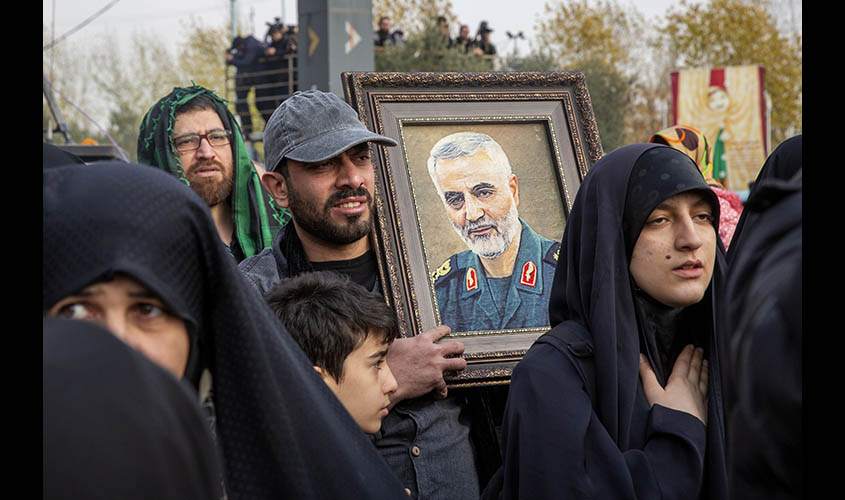One of the greatest strategic mistakes in recent times was the illegal and ill-advised US invasion of Iraq, which left a trail of destruction and chaos across the Middle East. Motivated by Saddam Hussein’s supposed possession of weapons of mass destruction, for which there was no evidence, President George W. Bush unleashed a short war, which permanently destabilised the region. Rattled by the disaster of the 9/11 attack on the United States, the Bush administration invaded Iraq in order to send a message to all countries, especially the recalcitrant regimes such as Syria, Libya, or North Korea, that American hegemony was here to stay. Put simply, the Iraq war was motivated by a desire to (re)establish American standing as the world’s leading power. Driven by the humiliation of 9/11, the Bush administration felt the need to reassert its position as an unchallenged hegemon, a classic strategic error which has led to numerous downstream disasters. One was the genesis of the murder of General Qassem Soleimani this week.
Qassem Soleimani’s role had been well beyond that of a military commander. He had been running the foreign policy in the Gulf region through alliances backed by force for many years. The key ingredient of Iran’s military power in the Gulf region, according to a 217-page 2019 report by the hugely influential think tank IISS, is the Quds Force, the external operations wing of the Islamic Revolutionary Guard Force (IRGC). Both the Quds Force and its late leader, General Soleimani, answered directly to Iran’s Supreme Leader, Ayatollah Khamenei, bypassing Iran’s conventional military structures to become effectively an independent entity. Following the overthrow of Saddam Hussein’s regime in 2013, Soleimani’s Quds Force intensified its operations across the whole of the Middle East, providing training, funding and weapons to non-state actors allied to Teheran.
The opportunity for Iran’s actions led directly from the advantage given to Iran by the US removal of Saddam Hussein, which completely changed the shape of the Middle East. Showing a complete lack of understanding of politics in the Middle East, the Bush administration gave Iran ample opportunity to become the dominant force in the region. Prior to the Iraq War, the Gulf Arab states saw Sunni Arab-ruled Iraq as something of a bulwark against any Iranian expansionism. With that bulwark gone, Iran successfully capitalised on its religious and cultural ties inside Iraq, which has a Shia-Arab majority, to become a dominant force in that country.
General Soleimani’s strategy was to replace the US as a dominant power in the Gulf region. When the Arab Spring protest erupted in 2011, he capitalised on the unrest in Bahrain, tapping into the legitimate grievances among that country’s majority Shia population, but also helped to arm certain violent groups. The IISS report argues that Soleimani’s support for these militant groups in Bahrain, Saudi Arabia and Kuwait was primarily meant to irritate and pressure their governments, which would impose a political cost for their partnership with the United States. Saudi Arabia has purchased expensive missile defence systems from the US, but these were unable to stop the relatively low-tech attacks that temporarily knocked out half of its oil production capacity last year, carried out, according to the Saudi foreign ministry, by Iranian-made missiles fired from the north of the kingdom.
It is perhaps Soleimani’s strong support of the Lebanese Shia Islamist movement, Hezbollah, which riled President Trump most of all. “Hezbollah has achieved unique status among Iran’s partners”, says the IISS report, which documents in detail Iranian supply routes via Syria and Iraq. Although the report classifies Hezbollah “more akin to a trusted junior partner and a brother-in-arms for Iran than a proxy”, it nevertheless says the group has become a central interlocutor for an array of Arab militias and political parties with ties to Iran.
Faced with a determined and cunning enemy, a silver-haired 62-year-old general, who was a cult hero for his fighters and the face of evil by his foes, it is perhaps not surprising that President Trump decided that assassination was the only solution to his embarrassment in the Gulf region, particularly after last week’s attack on the US embassy in Baghdad. The Pentagon insists that General Soleimani approved this attack.
“Iran and the other free nations of the region will take revenge for this gruesome crime from criminal America”, Iran’s President Hasan Rouhani said in a statement immediately after the assassination. His (Soleimani’s) death has redoubled the determination of the nation of Iran and other free nations to stand against America’s bullying, he added.
Iran has many ways and means to strike back to what it considers to be an “act of war”, to which they promise “harsh retaliation”. Head of Hezbollah, Hassan Nasrallah, issued a statement calling for the death of General Soleimani to be revenged. “Meting out the appropriate punishment to these criminal assassins will be the responsibility and task of all resistance fighters worldwide”. By murdering Soleimani, Trump has irresponsibly stirred a hornets’ nest, which will only lead to an escalation of violence, even war.
John Dobson is a former British diplomat to Moscow and worked in UK Prime Minister John Major’s Office between 1995 and 1998.

